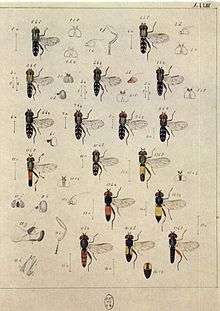Xylota tarda
Xylota tarda is a Palearctic species of hoverfly.[1][2]
| Xylota tarda | |
|---|---|
 | |
| Xylota tarda in Meigen Europäischen Zweiflügeligen
(figure 16) | |
| Scientific classification | |
| Kingdom: | |
| Phylum: | |
| Class: | |
| Order: | |
| Family: | |
| Genus: | |
| Species: | X. tarda |
| Binomial name | |
| Xylota tarda Meigen, 1822 | |
Description
External images
For terms see Morphology of Diptera
Wing length 5·5-8·5 mm. Large red areas on black abdomen. Wing membrane not infuscated. Dorso-apical white bristle on metatarsus 1. Antero-dorsal pale hairs on the basal half of femur 3 uniform not longer than 1/4 the depth of femur. The male genitalia are figured by Hippa (1968).[3] The larva is illustrated in colour by Rotheray (1994) ).[4]
See references for determination (but see Speight [5] for contradiction) [6] [7] [8] [9]
Distribution
Palearctic Fennoscandia South to Spain. Northern Italy (Apennines) Slovenia. Ireland East through Central Europe into European Russia and the Caucasus then through Russia to Siberia and the Pacific coast (Kuril islands).[10][11]
Biology
Old woodland species running on the foliage of bushes and shrubs and on tree stumps and nearby bare ground. The larva has been found in sap runs at the base of the trunk of Populus tremula and in rotting wood of Fagus.
References
- Stubbs, Alan E. & Falk, Steven J. (1983). British Hoverflies: An Illustrated Identification Guide (2nd (revised) ed.). British Entomological & Natural History Society. p. 271, xvpp. ISBN 0-9502891-3-2.
- Fauna Europaea
- Hippa, H. (1968) Classification of the palaearctic species of the genera Xylota Meigen and Xylotomima Shannon (Dipt., Syrphidae). Ann.Ent.Fenn., 34: 179-197.
- Rotheray G., 1993 Colour Guide to Hoverfly Larvae Diptera, Syrphidae in Britain and Europe Dipterists Forum pdf
- Speight, M.C.D. (2011). "Species accounts of European Syrphidae (Diptera)" (PDF). Syrph the Net, the database of European Syrphidae. 65: 285pp.
- Van Veen, M. (2004) Hoverflies of Northwest Europe: identification keys to the Syrphidae. 256pp. KNNV Publishing, Utrecht.addendum
- Van der Goot,V.S. (1981) De zweefvliegen van Noordwest - Europa en Europees Rusland, in het bijzonder van de Benelux. KNNV, Uitgave no.32: 275pp. Amsterdam.
- Bei-Bienko, G.Y. & Steyskal, G.C. (1988) Keys to the Insects of the European Part of the USSR, Volume V: Diptera and Siphonaptera, Part I. Amerind Publishing Co., New Delhi. ISBN 81-205-0080-6.
- Coe, R.L. (1953) Diptera: Syrphidae. Handbks.ident.Br.insects, 10(1): 1-98. R.ent.Soc.London. pdf
- Fauna Europaea
- Peck, L.V. (1988) Syrphidae. In: Soos, A. & Papp, L. (eds.) Catalogue of Palaearctic Diptera, 8: 11-230. Akad.Kiado, Budapest.